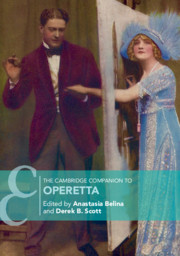Book contents
- The Cambridge Companion to Operetta
- Cambridge Companions to Music
- The Cambridge Companion to Operetta
- Copyright page
- Contents
- Illustrations
- Tables
- Music Examples
- Notes on Contributors
- Chronology, 1855–1950
- Introduction
- Part I Early Centres of Operetta
- Part II The Global Expansion of Operetta
- Part III Operetta since 1900
- 12 The Operetta Factory: Production Systems of Silver-Age Vienna
- 13 Berlin Operetta
- 14 Operetta in Italy
- 15 Operetta in Warsaw
- 16 British Operetta after Gilbert and Sullivan
- 17 Operetta During the Nazi Regime
- 18 Operetta Films
- 19 Australian Director Barrie Kosky on the Subversiveness of a Predominantly Jewish Genre: An Interview by Ulrich Lenz
- Select Bibliography
- Index
- References
13 - Berlin Operetta
from Part III - Operetta since 1900
Published online by Cambridge University Press: 14 November 2019
- The Cambridge Companion to Operetta
- Cambridge Companions to Music
- The Cambridge Companion to Operetta
- Copyright page
- Contents
- Illustrations
- Tables
- Music Examples
- Notes on Contributors
- Chronology, 1855–1950
- Introduction
- Part I Early Centres of Operetta
- Part II The Global Expansion of Operetta
- Part III Operetta since 1900
- 12 The Operetta Factory: Production Systems of Silver-Age Vienna
- 13 Berlin Operetta
- 14 Operetta in Italy
- 15 Operetta in Warsaw
- 16 British Operetta after Gilbert and Sullivan
- 17 Operetta During the Nazi Regime
- 18 Operetta Films
- 19 Australian Director Barrie Kosky on the Subversiveness of a Predominantly Jewish Genre: An Interview by Ulrich Lenz
- Select Bibliography
- Index
- References
Summary
The chapter narrates the history of operetta in Berlin. Compared to Paris, London and Vienna, Berlin was a latecomer when it came to popular musical theatre. The first operettas performed here were successes from other cities. However, in the last year of the nineteenth century, Berlin saw the beginning of a homegrown operetta industry with the success of Paul Lincke’s Frau Luna. As elsewhere, operetta was intimately connected with its locale, performed in the Berlin accent, reflecting on life in the city and inventing and popularizing local characters. This was just as true for the new generation of composers. Yet, their success abroad increasingly turned operetta into an international commodity. Berlin operettas were played in Paris, London, New York and many other cities around the globe until World War I put a stop to such cosmopolitanism. After the war, Berlin replaced Vienna as the operetta capital. The chapter ends with the rise of National Socialism, which spelt exile and death for the Jewish composers, directors and actors, without whom Berlin operetta would not have been possible. By reconstructing this story, the chapter rediscovers what once was a thriving and genuinely popular culture.
- Type
- Chapter
- Information
- The Cambridge Companion to Operetta , pp. 205 - 219Publisher: Cambridge University PressPrint publication year: 2019

